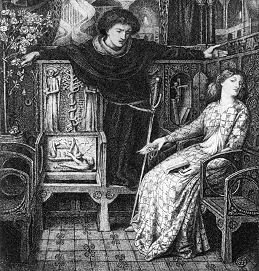Through out the course of Act 4, the play takes a turn into insanity. "To draw apart the body he hath killed..." Queen Gertrude's (line 23) depicts Hamlet's true discourse through his outbreak. Hamlet decides to keep it a secret where he hid Polonius's dead body. Prior to this Act, I thought it was notable Hamlet's conversation with is lover Ophelia, he exclaims his love for her isn't true because of his mother's new engagement to his uncle. This newly formed relationship had taken an emotional and physical toll on his perception of love which resulted in him resenting Ophelia. Back to Act 4, Hamlet is remorseless with his whereabouts of Polonius's body "Compounded it with dust, whereto tis' skin" (line 5). Obviously morbid and disturbing details are progressing throughout this act which will lead to a climax. Shakespeare incorporates a lot of twists in Act 4 which can be difficult to follow. The next monumental action of this act was Ophelia's stage directions, in other words, she has gone insane just like Hamlet. Enter Ophelia distracted, playing on a lute and her hair down singing." Here it is obvious Shakespeare is using foreshadowing on the fate of Ophelia. Also, Hamlet has corrupted Ophelia's perception of true love which I believe makes her retreat to this state of insanity. It seems very essential to the progression of this play for Hamlet to affect everyone around him, his insanity is contagious. "He is dead and gone, lady, He is dead and gone." (examples of songs Ophelia sings aloud).
Switching to a different character, Laertes returns with a vast amount of loyal followers to begin a rebellion. This rebellion does not qualify as insanity to me because Laertes wants to know where his father is and who killed him. Instead of Hamlet's over the top reaction, Laertes returns angry and fending for answers. So far it seems Hamlet has not corrupted Laertes with insanity although the loss of his father is a tragedy in itself.
Although in the middle of Act 4 there were a lot of remarkable moments, I wanted to discuss the death of Ophelia. It is said that she drowned in water because of her heavy clothing. It seems that Hamlet had such an effect on Ophelia that she may have attempted suicide. It is prominent that men have the largest effect over the population and in this sense, Hamlet denying his love for Ophelia has caused her to fall into a state of misery and depression. I feel this is an example of masculinity and power over women during this time period. Ophelia's death is tragic but it is Hamlet's emotional power over there that causes her death and loss in the play. Male power continues to be an underlying theme throughout Shakespeare's plays.


2 comments:
Act 4 definitely turned to insanity and chaos. I felt there were many parallels in the play as well. Some that I saw were the deaths of fathers with Hamlet and Laertes which they both went a bit “insane” over. Also there was Hamlet and Ophelia's insanity. I thought it was very interesting how Ophelia went crazy for the same reason as Hamlet. Although there is question about whether Hamlet was “acting” insane, I believe he did have moments of craziness but he also used his behavior to get away with finding a way to avenge Claudius. His supposed behavior would have excused the way he questioned his mother. He knew when to turn it on and off. As for Ophelia her insanity came from a real place. As a woman scorned by Hamlet and a daughter who has lost her father, she has no hope because she was betrayed in two ways by someone she had loved. Had she not committed suicide, as I believe she did, she would not have been able to handle the events of Act V because everything gets crazy. She would have witnessed the loss of her brother and Hamlet who are two men she loves and this would have been too much for her.
It's interesting that you bring Laertes into this discussion, Amanda, as he is not questioned for his actions in bringing a rebellion to the court. It is also notable that he is there expressly for his father. Though he is disturbed by Ophelia's demise (and he jumps in the grave after her!) it seems that it is still his father's untimely death that motivates Ophelia. This is all to say that I think Laertes is an often overlooked but interesting character to consider in light of the various topics you touch upon here. I'd be curious to hear what else you think about this character!
Post a Comment